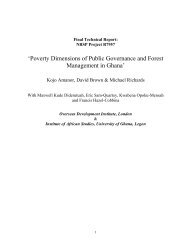The Gambian Tourist Value Chain and Prospects for Pro-Poor Tourism
The Gambian Tourist Value Chain and Prospects for Pro-Poor Tourism
The Gambian Tourist Value Chain and Prospects for Pro-Poor Tourism
Create successful ePaper yourself
Turn your PDF publications into a flip-book with our unique Google optimized e-Paper software.
<strong>Tourism</strong> in <strong>The</strong> Gambia: International ‘Best Practice’ in Poverty Reduction & <strong>Pro</strong>-<strong>Poor</strong> Growth Through <strong>Tourism</strong><br />
Draft Report (Friday 22 nd December 2006)<br />
This failure to provide bulk services to the TDA, even on the boundary of the existing urban<br />
area imposes a significant financial burden on the tourist sector <strong>and</strong> significant constraint<br />
to dispersing accommodation. One hotel manager described his job as managing a power<br />
station with some beds attached. This situation also imposes serious environmental <strong>and</strong><br />
<strong>for</strong>eign exchange constraints on <strong>The</strong> Gambia with even small hotel owners having to import<br />
small, inefficient generators <strong>and</strong> constant fuel supplies.<br />
Even if the electricity supply system was reliable, there are legitimate pricing concerns <strong>for</strong><br />
the tourism sector. NAWEC rates cross-subsidise domestic electricity consumers from<br />
commercial tariffs.<br />
Box 16: <strong>Pro</strong>-<strong>Poor</strong> <strong>Tourism</strong> Regulatory Issue # 15<br />
GTA should explain the costs borne by the tourism sector arising from the poor service<br />
st<strong>and</strong>ards offered by government-run NAWEC <strong>and</strong> the urgent developmental case <strong>for</strong> a<br />
trans<strong>for</strong>mation of the per<strong>for</strong>mance of the organisation.<br />
In policy statements, <strong>The</strong> Gambia has committed itself to a rapid increase in visitor number<br />
<strong>and</strong> increasing numbers of up-market tourists – yet is apparently unable to provide, or<br />
operate, the infrastructure on which this increased dem<strong>and</strong> depends. <strong>The</strong> impact of<br />
continuing as present is likely to undermine the policy of spreading the benefits of tourism<br />
more evenly throughout the country – an important plank of government tourism policy. It<br />
is clear from the analysis of the supply pipeline <strong>for</strong> new hotels that the inability to exp<strong>and</strong><br />
the bulk supply network is effectively <strong>for</strong>cing almost all new investors back into the tourism<br />
‘enclave’.<br />
6.3 Lack of choice in accommodation<br />
<strong>Gambian</strong> tourism depends upon a relatively uninspiring menu of modest quality<br />
accommodation <strong>and</strong> a ‘winter sun’ product. This has been long-recognised in tourism policy<br />
<strong>and</strong> the need to diversify the tourism offering to incorporate different niche markets<br />
(birding, fishing, slavery ancestry, etc) <strong>and</strong> to develop up-country tourism product has been<br />
identified <strong>for</strong> the past twenty years.<br />
Through existing development control, l<strong>and</strong> ownership of the TDA <strong>and</strong> marketing powers,<br />
the Government has many of the regulatory levers to encourage diversification of the<br />
tourism product. Generally, poor use has been made of these potential mechanisms to<br />
generate diversity <strong>and</strong> government regulations have been exercised in a way that<br />
exacerbates, rather than reverses, the current tourism product.<br />
One of the new modest quality accommodation available © Jonathan Mitchell<br />
44

















